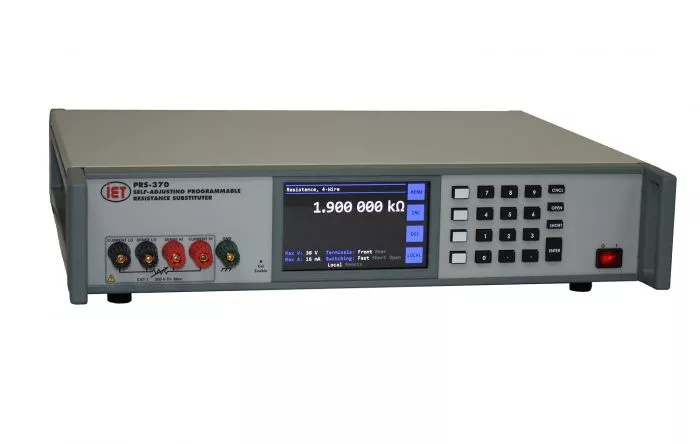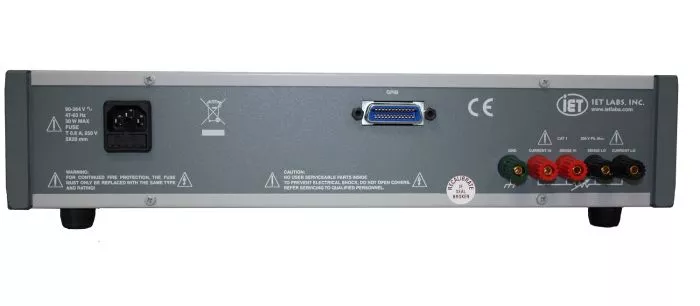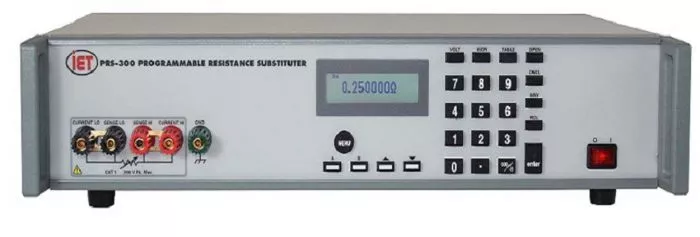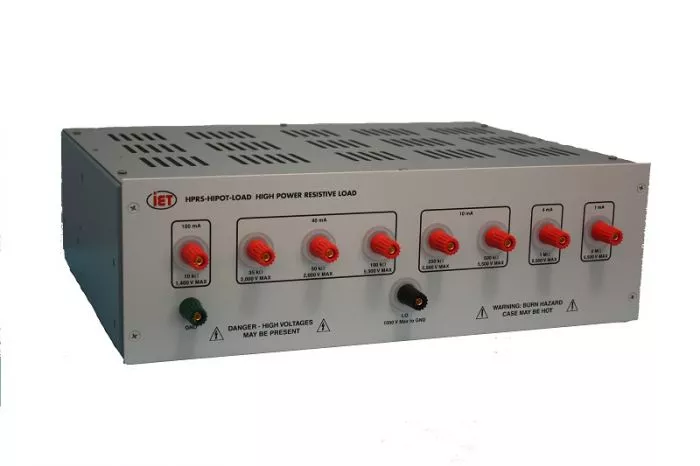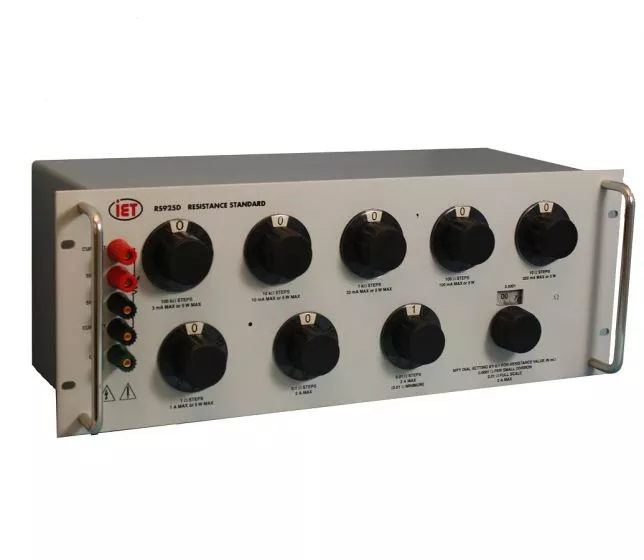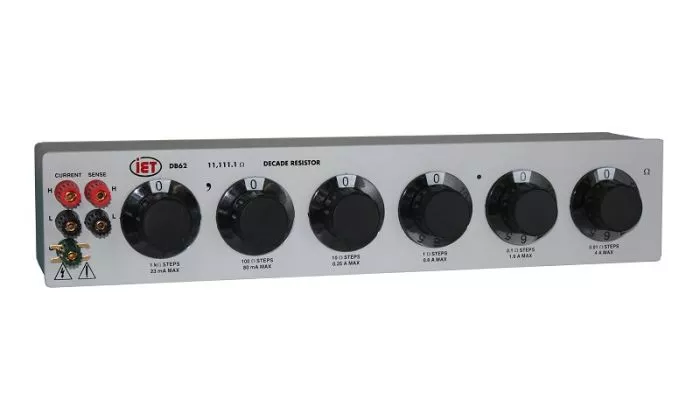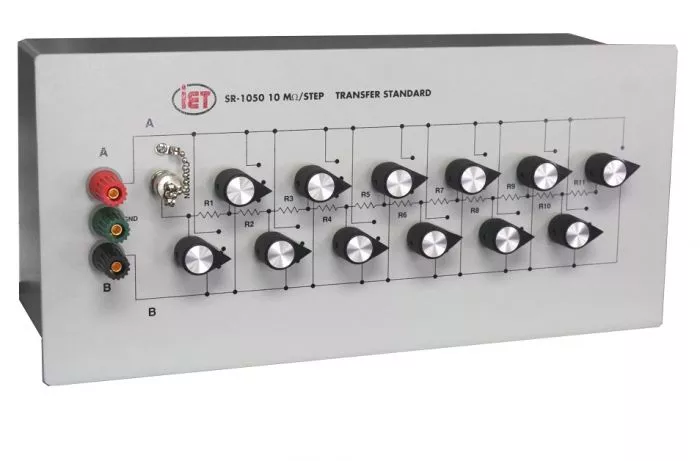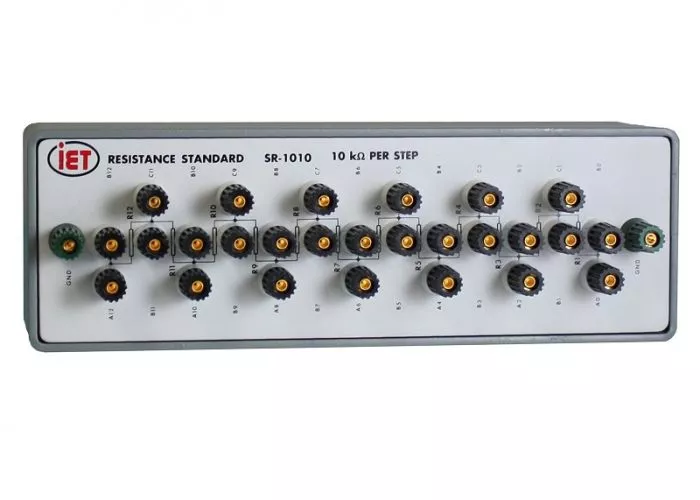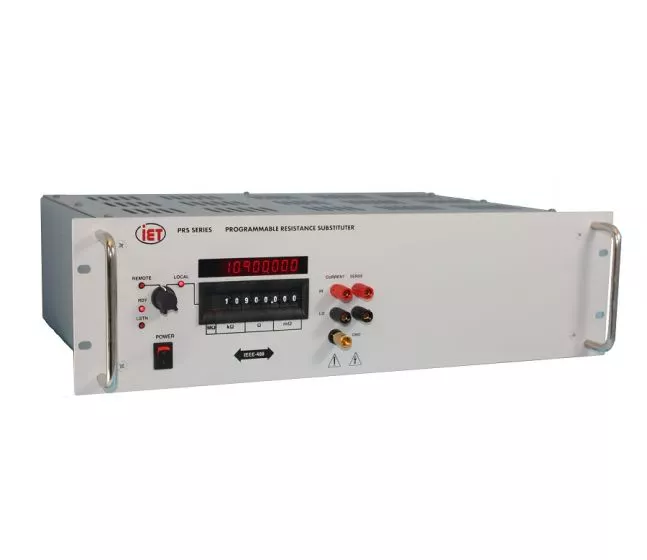Description
PRS-370 patented advantages over traditional decades:
- Self-adjusting improves accuracy to better than 10 ppm replacing individual resistance standards
- Always have the rights resistance standard to calibrate new instruments
- Single button press adjustment, of the internal resistors, saves time of manual trimming or manually entering resistor calibration values
Overview
The PRS-370 is a Self-Adjusting Programmable Resistance Substituter, just connect an 8.5 digit DMM; Fluke 8508A, 8588A or the Keysight 3458A to the PRS-370 via the IEEE-488 interface, and the PRS-370 becomes a short-term stable variable standard of resistance.
The PRS-370 instructs the DMM to make a measurement of the source resistance and then automatically fine adjusts the output resistance to achieve the “best” accuracy to the nominal resistance value, typically better than 10 ppm.
The PRS-370 utilizes both the front and rear binding posts so that the DUT and DMM can be connected at the same time. Once the resistance measurement is complete using the DMM and rear binding posts, the source resistance is switched to the front binding posts.
The large graphical color display shows the target resistance, ∆ from nominal, measured resistance from the DMM and measurement uncertainty of the DMM.
Save time in adjustment
At the touch of a button the built-in firmware routine allows for automatic calibration of the internal resistors by just connecting a DMM to the PRS-370 . No entering values or manual trimming saves significant time over traditional programmable resistance decades or manual decades.
The right mix of features
The PRS-370 was designed with the right mix of features for to be efficient for both manual and automated application in both laboratory and production environments. With its wide range the PRS-370 was designed to replace multiple decade boxes, individual resistance standards and reduce test time.
User interface
The PRS-370 utilizes a large state-of-the-art color capacitive touchscreen which provides super fast response time. Even in low or bright light conditions the display provides exceptional clarity with large fonts and easy-to-read menus.
The user interface makes the PRS-370 well suited for high accuracy requirements for both manual and automated applications such as; calibration of resistance meters, calibration of temperature controllers and indicators, automated test systems requiring a precision resistive load
The user interface also features softkeys and a numeric keypad allowing use of the user interface without using the touch-screen.
No zero resistance
The PRS Series programmable resistance box employs very low resistance, low thermal emf relays with gold-clad silver-alloy contacts. A special design keeps contact resistance to a minimum. The gold plating keeps the silver contacts from becoming tarnished when unused, or when only low currents are passed through them. This is most often the case when only minute test currents are drawn by digital multimeters and other test instruments. Contact resistance remains low and repeatable through the use of multiple contacts.
Highest quality components
The programmable resistance box employs, high-quality gold-plated tellurium-copper five-way binding posts serve to minimize the thermal emf effects, which would produce errors in dc resistance measurements. Resistors are custom Z-foil and low inductance wirewound for low TC and excellent stability.
5 year warranty
With its industry leading 5 year warranty all aspects of the PRS-370 focus on reliability, reduced ownership costs and simplicity out of the box.
RTD calibration
The PRS-370 is also a programmable decade resistor and RTD simulator that can be used stand-alone to automate your source resistance and temperature controller testing.
Built-in tables for PT100 and PT1000 RTDs and direct resistance substitution makes the PRS-370 ideal for for RTD (Resistance Temperature Detector) simulation. User defined tables can also be created for use with other RTDs. The operator can enter temperature directly and the correct resistance will automatically be programmed.
Resistor carousel
Built-in EIA “preferred value” resistance tables of 1% (E96), 5% (E24), 10% (E12) increments or user specified increment allows the PRS-370 to be used as a resistor carousel.
AC performance
The PRS-370 programmable resistance box is a precision resistance source with excellent characteristics of stability, temperature coefficient, and power coefficient. The use of low inductance wirewound and Z-foil resistors allows the PRS-370 to be used in ac applications with minimal resistance change below 1 kHz.
See PRS Decade Resistor ac Performance Application Note for additional information.
Interface
Operation is both local using a color touch screen and numeric keypad or remote control with the standard IEEE-488 interface. The versatility of the IEEE-488 interface allows you to completely automate your testing when not used with a DMM.
Calibration history
Calibration history of each internal resistor can be reviewed to show drift and performance. The calibration history data can be retrieved via SCPI command for further analysis.
Pressing a switch on the front panel allows access to calibration history and adjustment menus minimizing unauthorized access.
Cyber security statement
The PRS-370 contains a microcontroller, and runs proprietary firmware. The firmware can only be updated via a JTAG or similar cable and only accessed by removing the top cover of the instrument.
There are no facilities to update firmware via the GPIB interface on the PRS-370.
Windows or Linux are not used in this product.
A factory reset is provide which will reset the PRS-370 back to factory default including calibration data history and all other data that can be saved by a user.
Also see PRS-330 Programmable Decade Resistor
The PRS-330 Programmable Decade Resistance Substituter features USB, Ethernet and IEEE interfaces without the ability to control an 8.5 digit DMM, Fluke 8508A, 8588A or the Keysight 3458A.
Optional Rack Mounting
The PRS Series programmable resistance box may be rack mounted to serve as components in measurement and control systems.

